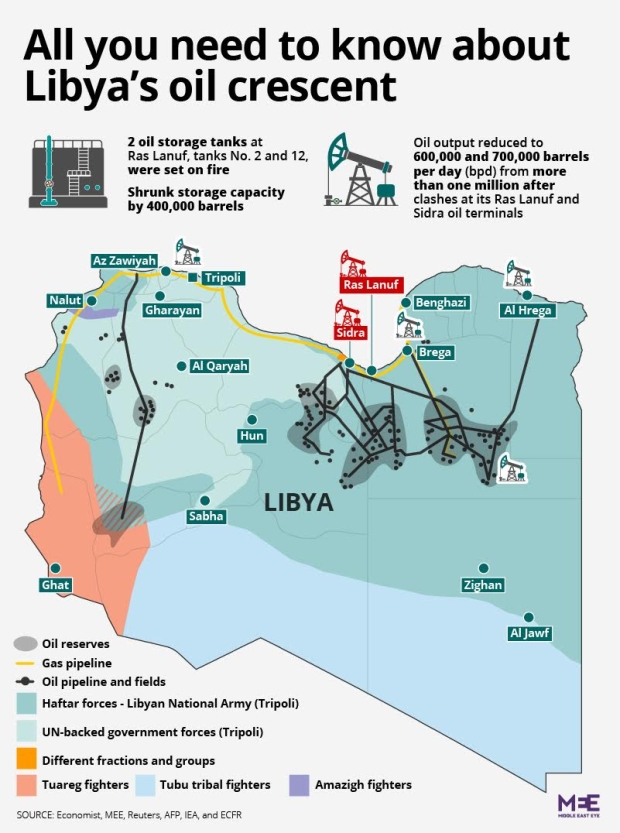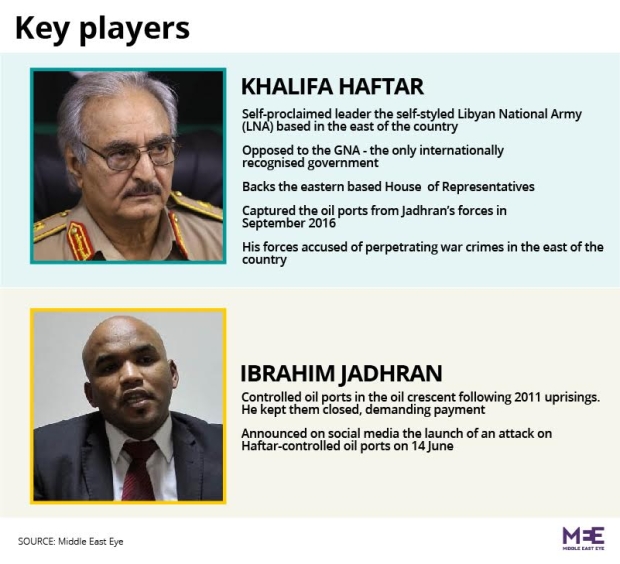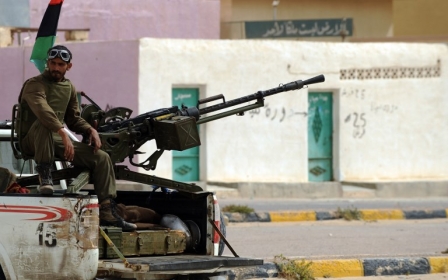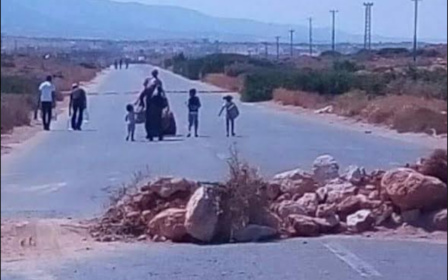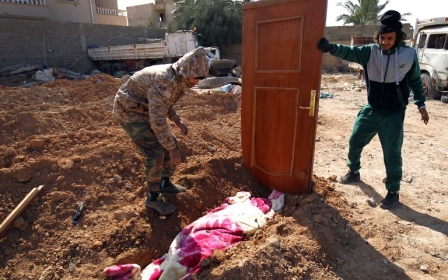Libya war: Haftar's high stakes oil gambit
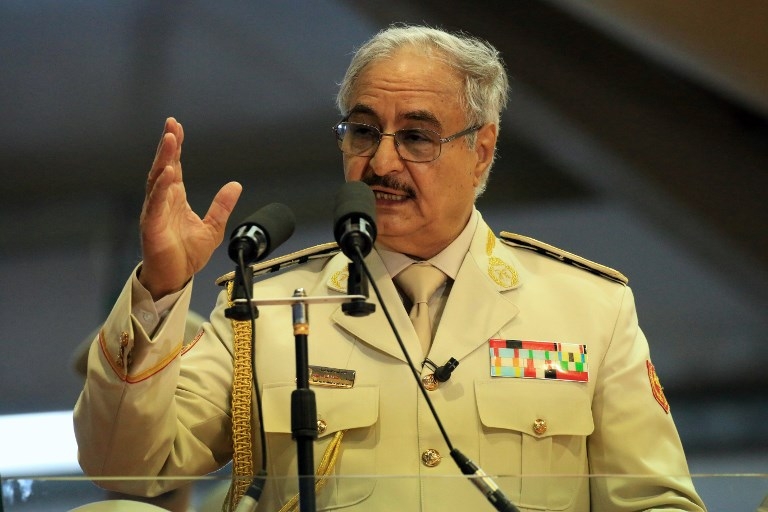
In the last fortnight, the leader of the Libyan National Army (LNA), Field Marshal Khalifa Haftar, has made a series of moves that have unsettled the international community, blocked the majority of Libya's oil exports, and upended the domestic status quo.
Waning legitimacy
Following a failed assault by rebel militant leader Ibrahim Jadhran to capture key oil ports in Libya's strategic Oil Crescent region on 14 June, Haftar declared that all eastern oil ports under his control would be administered by the illegitimate Benghazi-based National Oil Corporation (NOC), an institution aligned and submissive to Haftar's whims, rather than the internationally recognised and UN-legitimated Tripoli-based NOC.
The LNA controls most of eastern Libya and is opposed to an internationally recognised government based in Tripoli, which has itself condemned Jadhran's attacks.
Haftar has justified his move as an attempt to end the corruption and inequitable distribution of resources from the Tripoli-based Central Bank of Libya, Libya's defacto treasury. But rather than holding Libya's oil to ransom, Haftar's move appears to be more about challenging the international community over who should be considered "legitimate" in the divided country.
And why? Because it serves to consolidate his waning domestic legitimacy.
Haftar's move appears to be more about challenging the international community over who should be considered “legitimate” than outright banditry
And so far it has paid off – Haftar's move appears to have strengthened his legitimacy in Eastern Libya, at least in the short term. Part of the reason Jadhran was able to launch his attack on the oil facilities in mid-June was due to increasing discontent with the LNA among the Magharba tribe and other local blocs and groups in the Oil Crescent due to Haftar's failure to make good on his promises to improve their standard of living and security.
As a result, Haftar lacked the option to return to "business as normal" in the Oil Crescent following the routing of Jahdran's forces.
Rather than focusing primarily on the politics of military domination and recrimination against Jadhran and his potential supporters in the Oil Crescent, which could easily have made the LNA less popular, Haftar opted for a big, bold political move. In challenging the Tripoli-based institutions over the control of oil income he aimed to win support in the region, completely shifting the discourse and existing political framework within Libya.
And in doing so Haftar has already had numerous statements of support roll in from local and national political bodies in Eastern Libya and the Oil Crescent, especially in the oil producing areas of the Sirte basin such as Jalou, Awjala and Ejkherra.
It has even defanged the demands and grievances of Cyrenaican Federalists, who issued a statement on 27 June supporting Haftar's move.This indicates that Haftar may have consolidated local support for the LNA in the Oil Crescent that was previously ebbing.
In addition, Haftar's recent announcement that the Islamist-governed north eastern city of Derna has been liberated - despite continued "mopping up" operations continuing as was the case after the supposed liberation of Benghazi - will further help him consolidate his power in the east and Oil Crescent both tactically (by allowing him to redeploy security forces) and in a strategic sense.A short-lived gambit
Strategically, his projected image of military prowess combined with a joint federalist and nationalist political agenda (i.e. more resources for the east and ending corruption within the central bank which affects all Libyans) is finding resonance. However, Haftar's gambit is likely to be short-lived if it doesn't culminate in economic reform. Libya’s economy is on the verge of collapse and, with the hot summer months looming ahead, electricity blackouts, interminable lines at petrol stations, and food shortages will become even more common place.
The only way for Haftar to gracefully exit his bold gambit before economic pressure harms his supporters, is if the international community is able to broker the replacement of central bank governor Sadiq al-Kabir. Al-Kabir, elected as the bank governor in late 2011, has been accused of political partisanship throughout the last six years as well as providing advantageous access to letters of credit to Haftar's rivals in Misrata and Tripoli.
However, even if Kabir is successfully replaced, Libya's economic and institutional issues cannot be solved quickly, nor can wide-reaching change be introduced without a serious political will and a new institutional framework to back it up.
If Haftar's move in the Oil Crescent does not result in any changes in the central bank or any other concessions that Haftar could use as a face-saving way out, then Haftar could quickly lose his support as people suffer from the economic repercussions of the lack of oil revenue.Catastrophic impact
The oil blockades are set to have catastrophic impact on Libya's economy if they are prolonged, including skyrocketing prices of basic goods, shortages of supplies, power blackouts, and an increase in fuel smuggling.
If Haftar and the Eastern NOC are unable to convert their demands for Kabir to be replaced into more cash and services in the pockets of normal people in the East, then the implications for social instability and new revolutionary conditions are severe.
Regardless, if the standoff is prolonged or gets out of hand due to its very negative implications on normal life then the regional politics that have effectively forced the LNA to legitimise a nationalist "blockade" of oil production to pressure Tripoli are likely to become weaponised. Haftar is not a Federalist nor a supporter of partition.
Yet by actively undertaking a step which promotes separate eastern institutions, there is a danger that if the move fails to quickly produce concrete results, Haftar will be forced to make an unexpected choice: either backdown by making a U-turn and relinquishing control to the NOC or embrace a separatist stance.
Haftar is usually thought of as Libya's master strategist. Malicious, maybe, but certainly far-sighted. Compared to other major Libyan figures who completely lack political experience, this appraisal may be true, but in this instance, the general has unleashed a range of forces that are beyond any single man to contain.
- Jason Pack is the founder of Libya-Analysis® and the former Executive Director of the U.S.-Libya Business Association.
The views expressed in this article belong to the author and do not necessarily reflect the editorial policy of Middle East Eye.
Photo: The leader of the Libyan National Army (LNA) Field Marshal Khalifa Haftar has recently made a series of moves that have unsettled the international community (AFP)
This article is available in French on Middle East Eye French edition.
New MEE newsletter: Jerusalem Dispatch
Sign up to get the latest insights and analysis on Israel-Palestine, alongside Turkey Unpacked and other MEE newsletters
Middle East Eye delivers independent and unrivalled coverage and analysis of the Middle East, North Africa and beyond. To learn more about republishing this content and the associated fees, please fill out this form. More about MEE can be found here.



